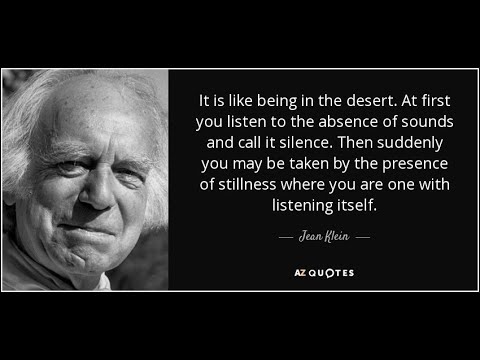Jean Klein
At certain moments, when alone, we feel a great lack deep within ourselves. This lack is the central one giving rise to all the others. The need to fill this lack, quench this thirst, urges us to think and act.
Without even questioning it, we run away from this insufficiency. We try to fill it first with one object then with another, then, disappointed; we go from one compensation to another, from failure to failure, from one source of suffering to another, from one war to another.
This is the destiny to which a large part of humanity devotes itself. Some resign themselves to this state of being which they judge to be inevitable. Others at first deluded by the satisfaction brought about by these objects come to realize that they give rise to a surfeit and even to indifference.
Some are brought to take a closer look. The object fully satisfies us for a short time during which we are back in our intrinsic nature, fulfillment. At the moment of fullness there is no awareness of an object. Thus the object cannot be the cause of our experience. It is essential to come to know these moments of joy without object.
We habitually attribute a cause to joy, we turn joy into an object because memory links the two together, but in reality they are of two entirely different natures. Thus we realize that the object is consumed in the joy of our being.
It is only through silent awareness that our physical and mental nature can change. This change is completely spontaneous. If we make an effort to change we do no more than shift our attention from one level, from one thing, to another. We remain in a vicious circle.
This only transfers energy from one point to another. It still leaves us oscillating between suffering and pleasure, each leading inevitably back to the other. Only living stillness, stillness without someone trying to be still, is capable of undoing the conditioning our biological, emotional and psychological nature has undergone. There is no controller, no selector, no personality making choices.
In choiceless living the situation is given the freedom to unfold. You do not grasp one aspect over another for there is nobody to grasp. When you understand something and live it without being stuck to the formulation, what you have understood dissolves in your openness. In this silence change takes place of its own accord, the problem is resolved and duality ends. You are left in your glory where no one has understood and nothing has been understood.
Works of art
When talking of works of art, we must first of all distinguish between true works of art and what we might call artistic works. A work of art always arises from the background: consciousness. Be it music, painting, architecture, poetry or sculpture, it is always seen by the artist in an instant, like a flash of lightning, as it surges forth from deep within him.
Afterwards he elaborates it, gives it body and form, in time and space. The Last Supper by Leonardo da Vinci was undoubtedly conceived in perfect simultaneity. We can say the same of the Art of the Fugue by Bach and of certain of Mozart’s compositions.
An artist worthy of this name is never preoccupied by the material he uses, nor even by the subject matter or the anecdotal side of his work.
Excerpted from ‘I Am,’ compiled and edited by Emma Edwards. The 108th birth anniversary of Jean Klein is observed on October 19







